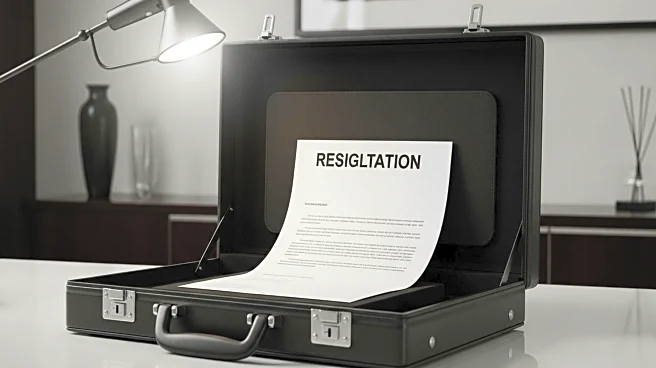What's Happening?
Rachel Cohen, a former associate at Skadden, Arps, Slate, Meagher & Flom LLP, resigned from her position due to dissatisfaction with her firm's response to President Trump's executive orders targeting Big Law firms. Cohen, who publicly announced her resignation on LinkedIn, expressed concern over the firm's perceived inaction against Trump's measures, which include revoking security clearances and reviewing government contracts of law firms he views as politically opposed. Before resigning, Cohen sought advice from her parents and reached out to Skadden's management, hoping for an industry-wide response to the executive orders. Despite receiving a response thanking her for her perspective, Cohen felt compelled to leave after another law firm, Paul Weiss, negotiated terms with Trump to have an executive order rescinded.
Why It's Important?
Cohen's resignation highlights the tension between legal professionals and the Trump administration, as several high-profile law firms face executive orders that could impact their operations and client relationships. The situation underscores the broader implications for the legal industry, as firms navigate political pressures while maintaining their business interests. Cohen's actions, including circulating an open letter among associates, reflect growing discontent within the legal community regarding perceived capitulation to political demands. This development may influence other legal professionals to reconsider their positions and advocate for stronger resistance against political interference in legal practices.
What's Next?
The resignation of Cohen and the ongoing challenges faced by law firms may prompt further scrutiny and debate within the legal industry. Firms may need to reassess their strategies in dealing with political pressures and consider joining collective efforts to preserve the integrity of the legal system. As more than 500 law firms have already signed a brief denouncing Trump's actions, there could be increased collaboration among legal entities to challenge executive orders through legal channels. Cohen's vocal stance on social media suggests she may continue to influence discussions on the role of law firms in political matters.
Beyond the Headlines
Cohen's resignation raises ethical questions about the role of law firms in political conflicts and their responsibility to uphold legal principles amidst external pressures. The situation may lead to long-term shifts in how law firms engage with political entities and advocate for their clients' rights. Additionally, the executive orders targeting law firms could have cultural implications, affecting public perception of the legal profession and its independence from political influence.









